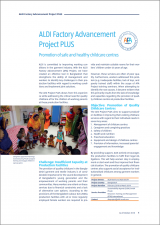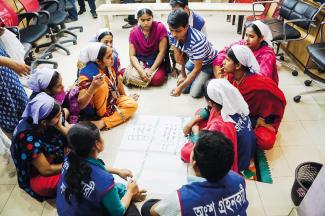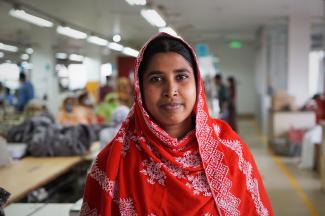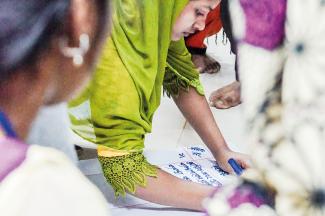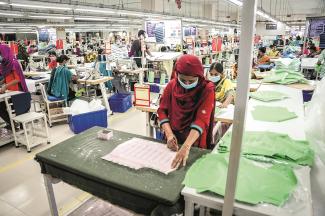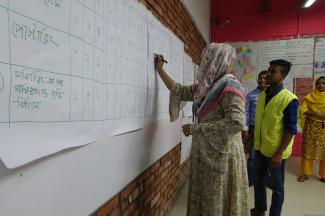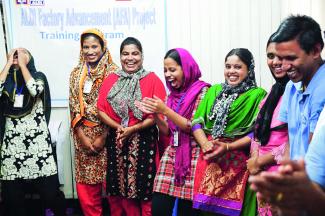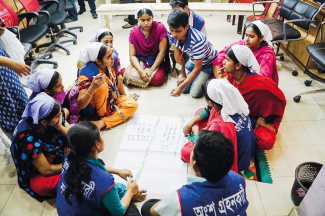
ALDI Factory Advancement Project
Our Approach
The ALDI SOUTH Group is committed to promoting human rights in the garment industry. Together with ALDI Nord, we introduced our ALDI Factory Advancement (AFA) Project, an effective tool that delivered change in factories that produce our garments in Bangladesh.
From 2013 to 2021, the AFA Project placed factory workers and managers at the centre of its activities to find sustainable solutions for improving workplaces. Its core principle was the promotion of dialogue and cooperation between workers and managers. Together they identified challenges, examined them critically and then created joint visions for the future with tailor-made solutions to reach improvement. Because of the commitment and the ownership of both parties, real change was achieved.

“I realised that my opinion and my ideas are important in order to advance my factory. We learned how to use good communication and dialogue to resolve any problems or conflicts in the factory.”
Rabeya, worker of an AFA Project factory
The key to the project’s success was the active involvement of the workers. Approximately 85,000 workers and their managers in 40 participating factories benefitted from the project and experienced positive changes in their day-to-day working environment.
Our Actions
Project Phase 1.0
The first phase of the AFA Project was successfully completed in the summer of 2019. During 450 AFA Project activities, workers, managers and AFA Project trainers discussed various topics such as the establishment of effective communication structures, health and safety in their workplaces, working hours, promotion systems, private financial planning, quality management and productivity. Additionally, six impact assessments were conducted to measure the success of the AFA Project.
Improved workplace cooperation creates sustainable solutions
Workers and managers at each factory identified and addressed a wide variety of different challenges found in their workplaces: from ensuring the use of personal protective equipment, improving the quality of canteen food or setting up structures to prevent inappropriate behaviour from supervisors and middle management.
Effective communication leads to cooperative behaviour and understanding
Poor communication was found to be a major cause of issues in the factories. We found behaviour on the production floor becomes more cooperative, with less stress and conflict, and more mutual understanding when we worked on improving communication.
The untapped potential in workers utilised for change
Throughout the AFA Project, we demonstrated to factory owners that the most important asset of their businesses are the employees. By providing a safe space for workers to discuss challenges, we became aware that their keen observations, creative ideas and influence on peers can play a big part in driving positive change processes in their factories.
Improved workplace cooperation increases productivity and quality
Workplace cooperation leads to increased job satisfaction, motivated employees, and improved conditions for workers. This is important in reducing sickness, absenteeism and employee turnover. It was also found to increase innovation, quality, productivity and ensure the long-term competitiveness of factories.
Project Phase 2.0
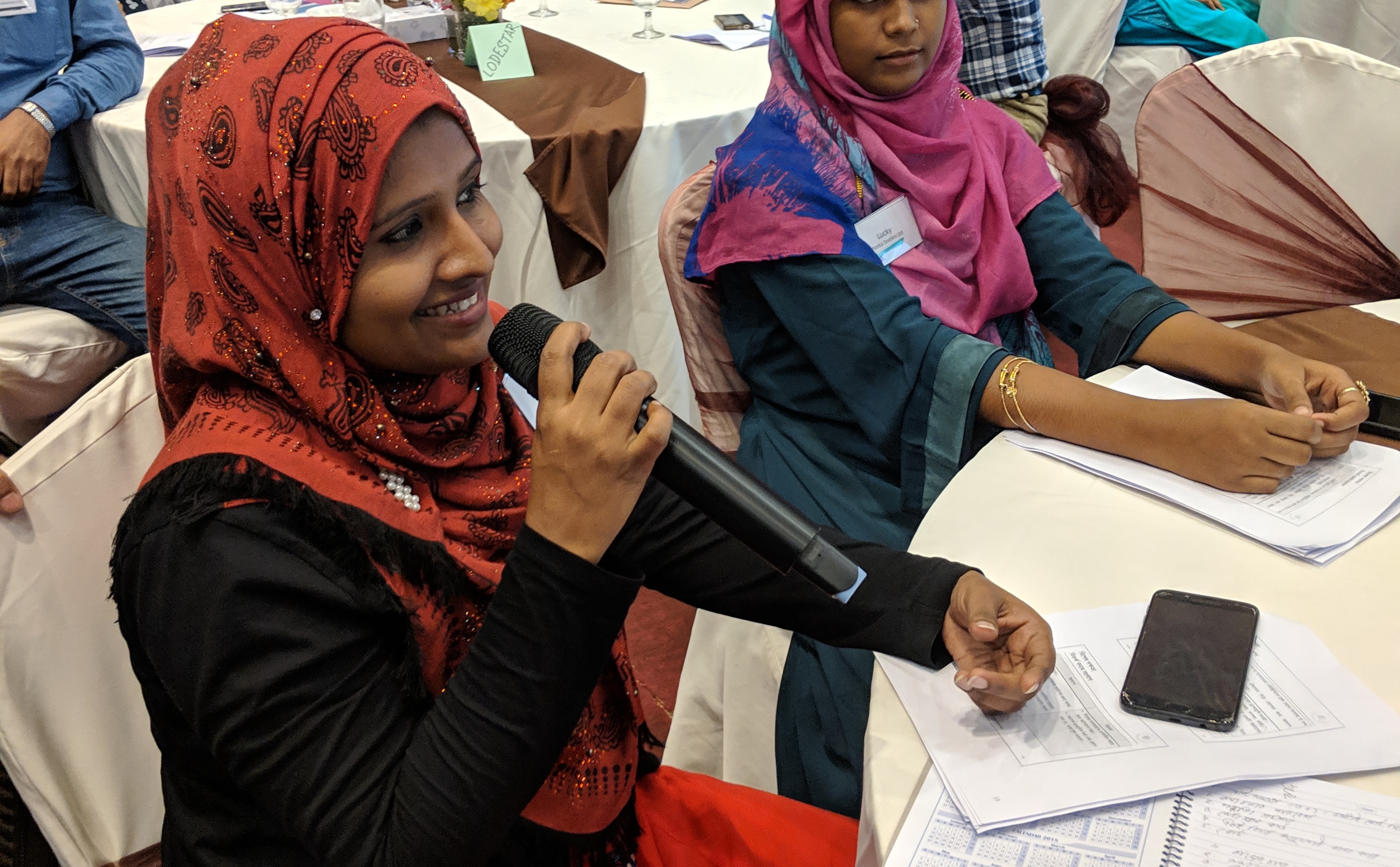 In the second half of 2019, we launched the exciting next phase of the AFA Project – an innovative pilot with selected AFA Project factories and business partners. Together we took the AFA Project to the next level: we used six years’ worth of experience to develop a programme that made factories independent of the support of AFA Project trainers.
In the second half of 2019, we launched the exciting next phase of the AFA Project – an innovative pilot with selected AFA Project factories and business partners. Together we took the AFA Project to the next level: we used six years’ worth of experience to develop a programme that made factories independent of the support of AFA Project trainers.
We know that skilled facilitators are key to creating sustainable solutions. It is the facilitators who provide the mindset and tools for dealing with complex challenges and who are driving positive change through workplace cooperation.
New approach
In AFA Project 1.0, AFA Project trainers guided the dialogue and cooperation between workers and managers.
In AFA Project 2.0, selected workers and managers will take over the role of project trainers. These workers and managers will facilitate dialogue and cooperation in their own factories.
Each factory selected workers and managers who were trained to be facilitators for workplace cooperation. They were enabled to assist other workers and managers in their factory to address workplace issues in a cooperative manner. They learned to moderate in their factory in order to find sustainable solutions for workplace issues.
AFA Project Plus: Childcare service
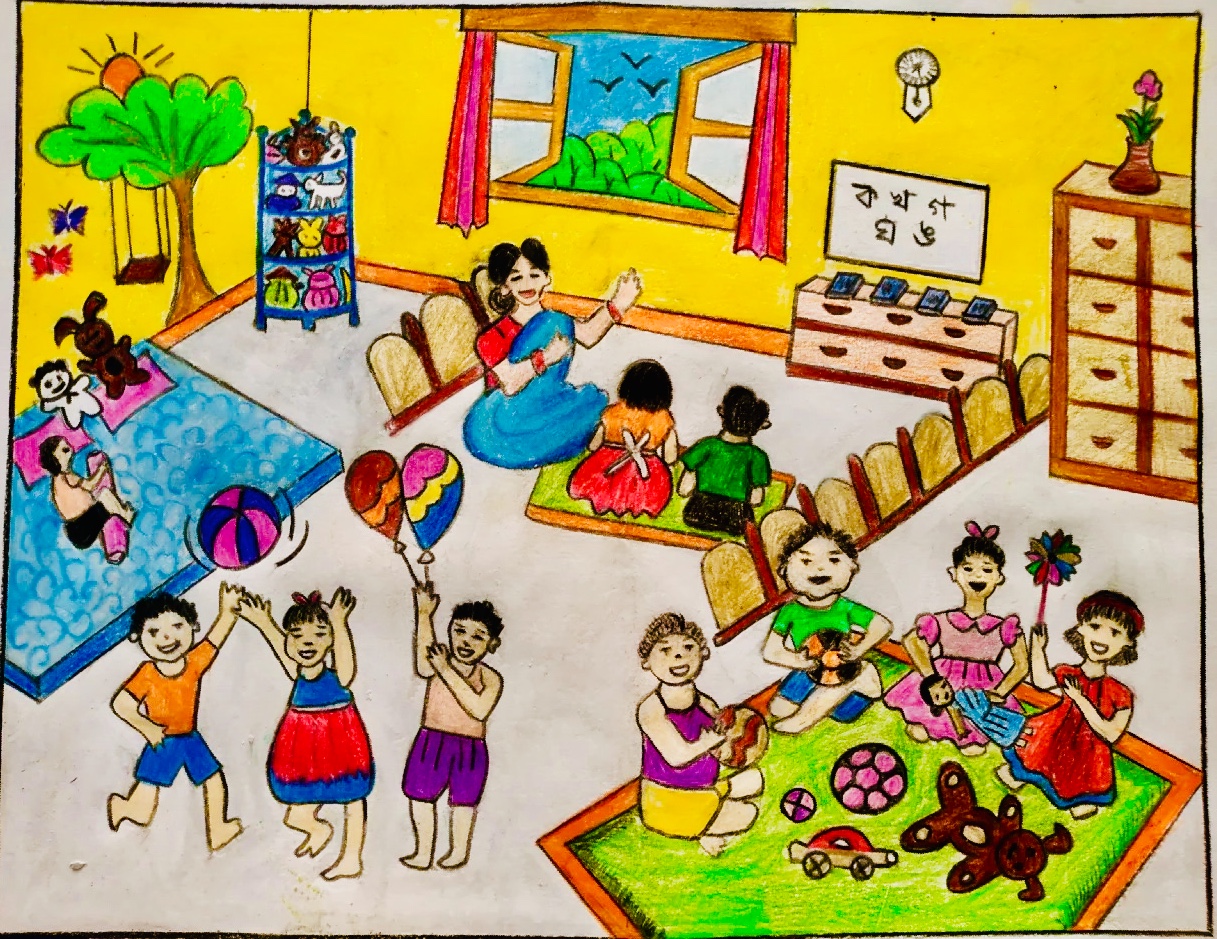 From 2016 until 2019, the AFA Project PLUS addressed the critical need for quality childcare for the children of working parents in factories that produce our textile goods in Bangladesh. ALDI supported selected factories participating in the AFA Project in improving their internal day-care services.
From 2016 until 2019, the AFA Project PLUS addressed the critical need for quality childcare for the children of working parents in factories that produce our textile goods in Bangladesh. ALDI supported selected factories participating in the AFA Project in improving their internal day-care services.
Many workers are reliant on these services due to financial constraints and a lack of alternative care options. Together with local non-governmental organisations, we trained caregivers, childcare centre supervisors, nurses and parents working at the factory. A total of 16 production facilities have been included in the AFA Project PLUS.
Seven areas for enhancement
The factories were assisted in enhancing their day-care centres in the following seven areas
- Management of childcare centres
- Caregivers and caregiving practices
- Safety of children
- Health and nutrition
- Preschool education
- Equipment and design of childcare centres
- Provision of information, increased parental engagement and knowledge
Our Performance
Phase 1.0 (2013-2019)
Workers and managers experienced positive change
Factories involved
Factory advancement project
Phase 2.0 (2019-2020)
Workplace issues were addressed
Factories were involved
Independent sessions were conducted by facilitators
